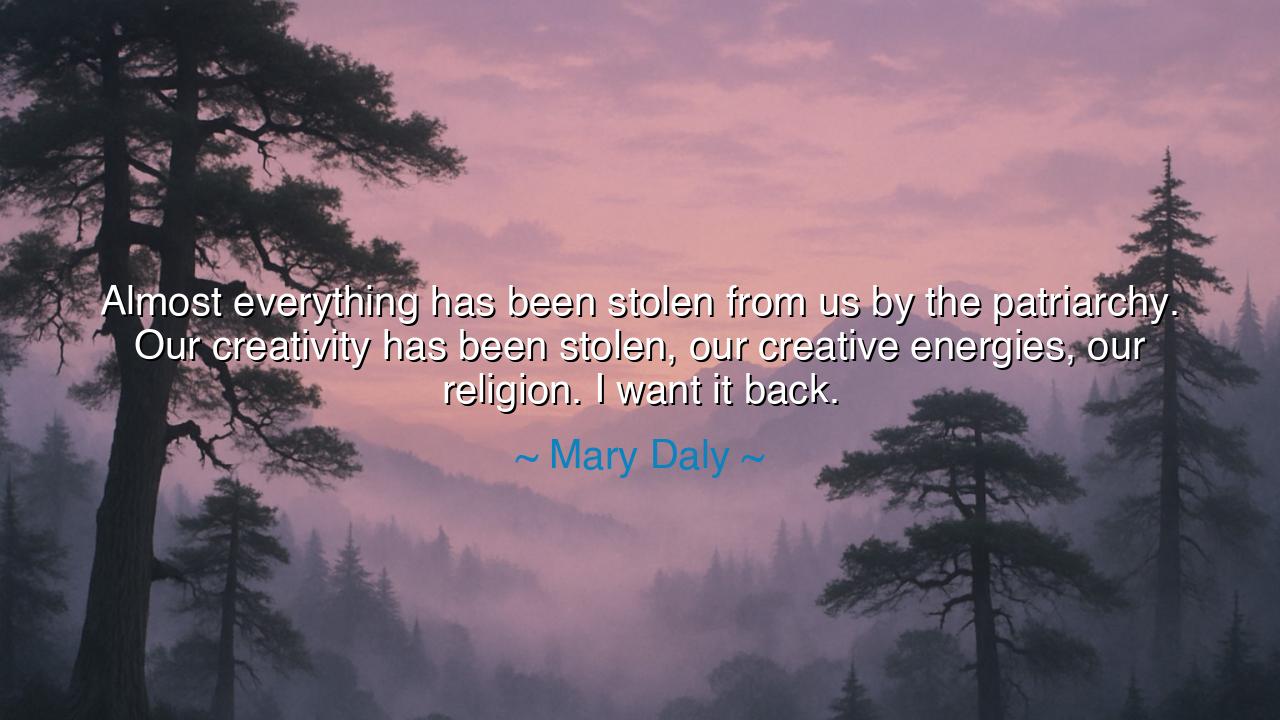
Almost everything has been stolen from us by the patriarchy. Our
Almost everything has been stolen from us by the patriarchy. Our creativity has been stolen, our creative energies, our religion. I want it back.






"Almost everything has been stolen from us by the patriarchy. Our creativity has been stolen, our creative energies, our religion. I want it back." These powerful words from Mary Daly, a radical feminist and scholar, reflect a profound and emotional cry for liberation and restoration. Daly’s statement speaks to the historical oppression and suppression of women’s voices, creativity, and spirituality under the forces of patriarchy. She argues that women, for centuries, have had their power and potential taken from them, not only through direct domination but through the systematic erasure of their contributions to culture, religion, and society. In this declaration, Daly demands the return of these stolen energies, urging women to reclaim their rightful place as creators and spiritual beings, unburdened by the patriarchal structures that have sought to diminish them.
The origin of Daly’s sentiment can be traced back to ancient wisdom about oppression and the forces that seek to suppress certain groups of people. Plato, in his Republic, explored the idea of a society in which all people, regardless of their gender or social class, are allowed to reach their highest potential. However, Plato’s ideal society was never realized, and instead, throughout history, patriarchy systematically limited the roles and opportunities available to women. The notion of creativity as a form of divine expression was curtailed for women, who were often seen as merely caretakers or subordinates to men. Just as Plato recognized the corruption of society, Daly sees the patriarchy as a force that has robbed women of their true power, both in their everyday lives and in their spiritual capacities.
Consider the life of Hildegard of Bingen, a 12th-century abbess, writer, and composer whose spiritual and intellectual contributions were groundbreaking for her time. Hildegard was a woman in a deeply patriarchal society, yet her visions and music were so powerful that they inspired many, even beyond her time. However, for centuries, her contributions were ignored, her writings suppressed, and her role in history minimized, largely because she was a woman. Her story is a reflection of Daly’s words — how the patriarchy systematically stole the recognition of women’s creativity and wisdom, relegating them to the margins of history. It wasn’t until the modern era that Hildegard’s works were rediscovered and acknowledged for their brilliance. Just as Daly calls for the reclamation of women’s creativity, Hildegard’s rediscovery serves as a reminder that the energies of women, though suppressed, are often far more enduring than patriarchal forces would like to admit.
In the same vein, consider the suffragette movement, which fought for the right of women to vote and be recognized as full citizens. Women like Susan B. Anthony and Elizabeth Cady Stanton were leaders of this movement, but for many years, their contributions were dismissed and even ridiculed. Their intellectual and political efforts were overshadowed by the deeply ingrained patriarchal system that deemed women’s voices unworthy of recognition. Just as Daly spoke of the stolen creative and spiritual energies, the suffragettes fought against a system that worked tirelessly to erase women’s agency and self-expression. Their eventual victory was not just the right to vote, but a restoration of the power that had long been denied to women.
Daly’s words also reflect a deeper spiritual truth, that religion has often been a tool for control rather than a source of empowerment. The patriarchy has long used religion as a way to subjugate women, placing them in secondary roles and stripping them of their spiritual autonomy. The ancient Gnostic traditions, for instance, offered a more egalitarian view of spirituality, one in which women were seen as equal participants in the divine. Yet these views were suppressed by early church authorities who sought to consolidate power and control through a male-dominated framework. Mary Daly, in her work, urged women to reconnect with the divine feminine, to reclaim their spiritual power and creative energies that had been systematically stolen by the patriarchal structures of religion. This call to action resonates with the ancient tradition of wisdom and empowerment, where spirituality was not confined to one gender or group, but accessible to all.
The lesson Daly imparts is one of reclamation and resilience. Women, throughout history, have had their creativity, agency, and spirituality stolen from them, but these qualities cannot be eradicated. They endure, waiting to be rediscovered and reclaimed. Daly’s call is not merely for a return to the past, but for a reawakening of the power and potential that has always existed within women. It is a call for self-empowerment, for women to recognize their inherent worth and creative capacity, not as subordinates to patriarchal systems, but as full participants in the creation of the world around them.
To apply this wisdom in our own lives, we must acknowledge the historical struggles that have shaped the way women’s creativity and spirituality have been suppressed. But we must also take active steps to reclaim these parts of ourselves. Whether through art, spirituality, activism, or personal growth, women today must refuse to be silenced, refuse to be restricted by outdated systems, and instead find ways to express their full potential. Let creativity be a tool of resistance, and let spirituality be a means of empowerment. The path forward lies in self-discovery and surrender to the innate power and wisdom that is already within. By reclaiming what has been stolen, women can rebuild a world that values their unique contributions and voices.






AAdministratorAdministrator
Welcome, honored guests. Please leave a comment, we will respond soon